#beatles historiography
Text
Tune In and sourcing--a caveat
I want to say something that I think has been missing from the recent discussion surrounding Mark Lewisohn here on tumblr, specifically. I know we have a well-founded contention about his bias and of late, great work has been done tracking down and dissecting the way he reshapes quotes out of context to support what appears to be his own narrative. @anotherkindofmindpod did a brilliant and necessary job of this with their Fine Tuning.
But note, they called it "fine tuning," a deliberate choice of words which indicates a nuanced and subtle critique of a work that still has its qualities. I think the whole point of this discussion is that Beatles history is still a growing field, and Lewisohn has been instrumental in moving it away from the Rolling Stone rock bro camp and into something better sourced and with greater care taken for the story it tells. It's manifestly not perfect, but their work (and others) is important in that it helps provide tools for understanding a work that is flawed, but has contributed massively to Beatles scholarship.
But lately, I've been seeing a trend around here where folks just assume he's making shit up out of whole cloth. Which is, as far as I can tell, extreme. First of all, he has a reputation that is extremely important to him, both as someone who uses sources scrupulously and as someone who wants to present himself as unbiased. We know that's not true (neither am I) but it's patently illogical to assume the guy is willfully throwing away his credibility with both hands when it's how he makes a living.
But of course he could be, so more than that, the thing we're missing here is that we don't have access to the sources he does. You can see us wrestling with this here: https://www.tumblr.com/mydaroga/739095948188368896/paul-would-claim-i-wasnt-brilliant-at-school-i. And it's well known in other corners of Beatles fandom that the audio of "Lennon Remembers" is different from the book. The David Sheff interview is known to be riddled with inaccuracies, transcription errors, and alterations. Yes, you can go look up the published version of the "Interview by David Sheff for Playboy, 1980." But we do not have the tapes of the interview, conducted over *weeks*, and altered considerably by the time they reached print.
I'm all for the sleuthing we've been doing of late and I think it needs to be part of the discussion around the way Tune In has, for the past ten years, been taken as gospel. I think Lewisohn's removal of context, smooshing together, and blatant cutting up on quotes is shameful and renders his work hugely biased. But it's a far, far different thing to immediately leap to the conclusion that he's risking his life's work to put words in John Lennon's mouth that weren't there. I'm just asking for us to consider all the possibilities before we dismiss everything the guy's ever done as made up drivel.
Because then we're no better than we think he is.
11 notes
·
View notes
Note
I’m curious about something. Is there concrete evidence of John attempting to strike Linda? I’ve. seen it mentioned various places but I’m a little skeptical. If it’s true that seems like it would be very hard for Paul to forgive. Your thoughts? Thanks.
Hiya @missu4everjohnny,
So for anyone reading this post who might not already be familiar with the story in question, Ill give you some brief business context:
The company Northern Songs was set up in 1963 by Dick James and Charles Silver, in order to publish Lennon/McCartney songs.
February 1965 it became a public company on the London Stock Exchange.
John and Paul each have 750,000 shares (15% each), while George and Ringo have 40,000 (0.8 %) each. During his divorce, John sold over 100,000 of his shares in order to set up a trust fund for Julian. Paul on the other hand bought 1000 shares (or 0.02% of the company).
By January 1969, Dick James had a growing concern about John Lennon’s recent behaviours, and the negative consequences they may have for the Northern Songs company in terms of stock value.
March 1969, Dick James and Charles Silver sell their shares in Northern Songs to ATV for £1,525,000, giving John and Paul no notice or the chance to buy them out. That way, ATV acquired 1,604,750 shares, which, in addition to the 137,000 they already had, gave them nearly 35% of the company.
John and Paul, who were both away on their honeymoons as they received the news about Northern Songs, felt betrayed and upset by James’s choice to sell his shares.
In April 1969, John found out that he had 644,000 shares (£1.25m), while Paul had 751,000 shares (£1.4m). John was furious with Paul.
@thecoleopterawithana did a particularly good breakdown on this whole saga, touching on both the business logistics and the emotional responses within it from John and Paul. So massive credit due to them for explaining the Northern Songs situation in a way that My-Little-Pea-Brain can actually understand, and do go give their post a read for a far more comprehensive understanding of all this!
But onto Johns reaction and whether he did in fact attempt to physically assault Linda McCartney.
Ken McNab writes in his book And In The End: the last days of the Beatles:
Various accounts over the years have suggested the two men almost came to blows. One unverified report has the volatile Lennon shaking his fist at Linda McCartney with Klein holding him back. Sheepishly, McCartney tried to defend his underhand actions: ‘I had some beanies and I wanted more.’ (pg. 101)
And Peter Doggett wrote in You Never Give Me Your Money:
Then Klein informed Lennon that McCartney had secretly been increasing his stake in Northern Songs. ‘John flew into a rage,’ recalled Apple executive Peter Brown. ‘At one point I thought he was really going to hit Paul, but he managed to calm himself down.’ One unconfirmed report of this meeting had Lennon leaping towards Linda McCartney, his fists raised in her face. (pg. 79)
These are the only two texts I could find specifying the report that John had made an attempt at physically assaulting Linda. Unfortunately, neither writer cites a source for the unconfirmed report, and Ive been unable to locate the claims origins—so I cant tell you how reliable its author is.
To the extent of my knowledge, no one else present during the occurrence has spoken about the alleged incident either—however, Peter Brown makes note that he believes John came close to physically attacking Paul, although in his original text The Love You Make he doesn't write anything on this:
“You bastard!” John spit. “You’ve been buying up shares behind our backs!”
Paul blushed and shrugged limply. “Oops, sorry!” he smiled.
“This is fuckin’ low!” John said. “This is the first time any of us have gone behind each other’s backs.”
Paul shrugged again. “I felt like I had some beanies and I wanted some more,” he said. (pg. 305)
So what is the likelihood of this being true, and what do I personally believe?
Honestly, I don’t know. I see it as plausible being that John has a history of physical violence, which Ive written about in more depth here. Im aware that he made conscious-efforts to change his behaviours over the years, and claimed in his 1971 interview with Peter McCabe and Robert Schonfield to have given up violence following the Bob Wooler incident in 1963—but we know from May Pang that there were still occasional incidents of physical violence. During a moment of stress, I could imagine he might have returned to old habits (and please note as well that ‘stress’ would not be a justification of this action in any way) and tried to attack Linda.
If John did make an attempt to physically attack Linda, my guess as to why Paul have been able to forgive (and seemingly forget) about the incident, is because it would have remained a hypothetical. It never really happened, so I feel like it would have been relatively easy for him to brush it off, because there were no actual consequences (or at least, no physical harm towards Linda caused).
However, I can also see that theres reasons not to believe the story. Both McNab and Doggett write of an ‘unconfirmed’ or ‘unverified’ report, meaning we have no idea who made this claim. As far as we know, the original claimant might not have even been in the room; it could be complete bollocks.
And although I wouldn’t really be surprised if Paul and even the Eastmans had chosen not to make a big deal out of the incident, Id be surprised if no one else present mentioned it—especially Peter Brown, given that he thought John came close to attacking Paul.
However, to counter that last point, another theory I have is that if Paul had been standing close to Linda at the time, perhaps it wouldn’t have been clear based on Johns erratic behaviour who he was aiming for—so while some people might have believed John was attempting to attack Linda, others might have thought he was aiming for Paul.
So in short—and I apologise about the very dissatisfactory response—my opinion on this really is just an ‘I Don’t Know’ one. It could go either way imo. It would be easier to discern an answer I think if we had access to the original report, but as far as Im aware, that hasn’t been released.
Sources:
Northern Songs breakdown (x) — @thecoleopterawithana
Dick James sells his Northern Songs shares to ATV (x)
The Beatles and ATV fight for the control of Northern Songs (x)
You Never Give Me Your Money — Peter Doggett
And In The End: the last days of The Beatles — Ken McNab
The Making Of John Lennon — Frances Kenny
The Love You Make: an insiders story of The Beatles — Peter Brown & Steve Gaines
For The Record — Peter McCabe & Robert Schonfield
#anyway lmk if theres any misinformation here lol#my brain doesn’t understand Business#northern songs#1969#john and paul#beatles historiography#john lennon#paul mccartney#asks#beatles#@missu4everjohnny
63 notes
·
View notes
Text
A BEATLE DIDN’T SAY THAT! Lewisohn’s lab-created quotes
“One of the things about this book that is a strength is it’s not me saying anything, it’s them or other people. I shape the text, I plot where it goes, I weave it, but the quotes are theirs. And so when I’ve got Paul McCartney behaving in a way some readers might think, ‘Whatever, oh dear,’ it’s actually him saying it. So you end up thinking that to his own credit he said that. It’s not me saying it.” (Mark Lewisohn, ‘Noted,’ (October 7, 2013) Somerset, Guy.)
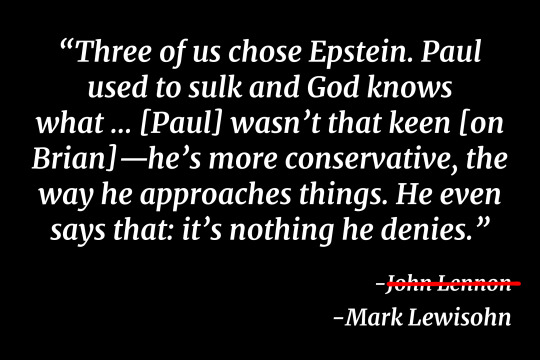
This is hella long, and that's because it's actually a full blog post. (In case you want it in a less monstrous form.)
A lot of people for a long time have put a lot of trust in Mark Lewisohn’s footnotes. Or at least in the fact of those footnotes. Because once you dig through them for any length of time you quickly discover that Mark Lewisohn’s footnotes hold secrets that would get him expelled from any undergraduate program. They reveal a “history” often contrived through a mass of Frankenquotes, ala carte creations, Lewisohn rephrased ‘paraphrases,’ and worse. For some parts of the narrative things aren’t too bad, yet in others monsters lurk around every corner. But this is not the sort of thing that’s graded on a curve, and it is past time to have a conversation about what standards should be accepted in Beatles’ scholarship.
Lewisohn lists his sources unlike most others. And his footnotes alone are more insightful than some other writers’ books. (Reddit, r/beatles)
I do not judge footnotes based on their insightfulness, nor do I want to single out a redditor, but I grabbed the comment because it’s an opinion that is widely shared and even accepted as canon. At least by people who have not combed those freakish footnotes. And while the pages of piled up sources do look fearsome en masse, a closer inspection reveals an offense to the truth, a threat to the record, and a blight on Beatles’ historiography.
“The rules for writing history are obvious. Who does not perceive that its chief law is never to dare say anything false, and never dare withhold anything true? The slightest suspicion of hatred or favor must be avoided. That such should be the foundations is known to all; the materials with which the building will be raised consist of facts and words.” –Cicero
A Look at Lewisohn’s Lab-created Frankenquotes
FIRST, WHAT ARE QUOTES? AND WHY ARE QUOTES?
Quotes are the soul and center of recorded—and recording— history.
And the rules around quotes and quotation marks are pretty simple. Most people, even if they’ve never written anything beyond a term paper, understand what quotation marks represent.
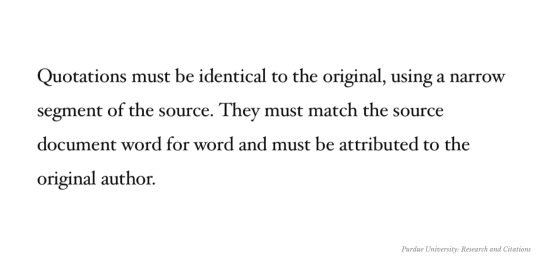
A set of quotation marks means, “This person said or wrote ‘these exact words’ at some given time.” You can smash a quote from two hours before or two years before right up against a separate quote to make your point—although it might get your grade lowered—but what you cannot do is take two different statements from two different times and make them seem like they are one statement.
When you put words inside one set of quotation marks you are stating, in black and white, that the identified person made this statement. That they said all those words together—or if you want to excise a reasonable part and use ellipses to represent that— as part of the same statement.
Look, combining two separate quotes that are not part of the same thought or topic is not a subjective issue. It is not an issue of controversy. Quotes are the bone marrow of written history. Quotes are the alpha and omega. In academic work or journalism they have to be, which makes sense as soon as you think about it. If it was cool for me to take a transcript and grab half a sentence from page 2 and half a sentence from page 17, push them together as if those words were spoken one after the other in a single thought, I bet I can manage to get those words to say almost anything I want.
Separate thoughts must be in two separate quotation marks. Separate. Somewhere between four sentences and a paragraph is widely accepted as the “two separate quotes” line, and there can be some ethical and technical wiggle room in a long rant by a person, but what makes all that subjective nonsense go out the window is if the quotes come from two separate questions. Or two separate days. That’s two quotes. Not hard.

Which again, makes sense if the point is conveying information to the reader and lessening the chance of a writer manipulating someone else’s words to express something that the person didn’t mean.
This is the contract inherent in a quote. These are the rules we all agree to and understand, and these are the reasons why. And there’s no reason to break them.
Why do you want me to believe that John said these two things at one time? What was wrong with what he did say?
THE FOUR MOST COMMON WAYS MARK LEWISOHN MAULS THE MEANING OF THE QUOTE:
The Basic Lewisohn Frankenquote 🧟♂️
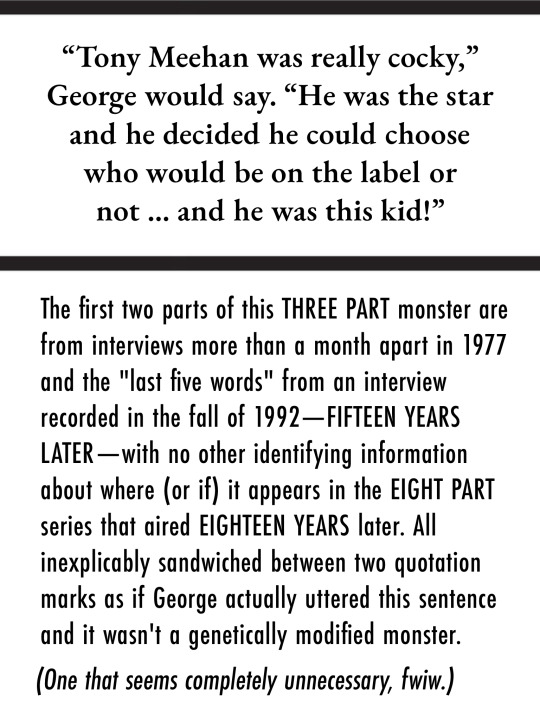
(“CONCLUDING FIVE WORDS FROM—” – I cannot even see the point of this THREE PART monster. Full footnote reads: 9) Author interview with Tony Meehan, September 6, 1995. (“I met George again in 1968 and for some reason he was harboring a grudge against me. He was very, very uptight about it—’You blocked us getting a recording contract …’ ”) First part of George quote from interview by Terry David Mulligan, The Great Canadian Gold Rush, CBC radio, May 30 and June 6, 1977; concluding five words from interview for The Beatles Anthology)
This three-headed monster attributed to George Harrison is a very dull little guy. Not particularly venomous. Just convenient, I guess. For whatever reason, Mark Lewisohn decided it was worth rummaging through the quote buffet until he collected enough pieces for George Harrison to say this thing. “…concluding five words from…” What are we even doing here? No, really. Please tell me.
And like a lot of the footnotes for these bespoke quotations, there are further problems. “[F]rom interview for Beatles Anthology”? An interview that aired? In one of the episodes? Can you narrow it down? I guess I’ll just have to listen very closely to them all and hope I don’t miss the five words.
But if we got bogged down in the sorts of trivial details that would immediately lose a college student a letter grade off a History 101 paper we would never get anywhere. We have to stick to the violent felonies.
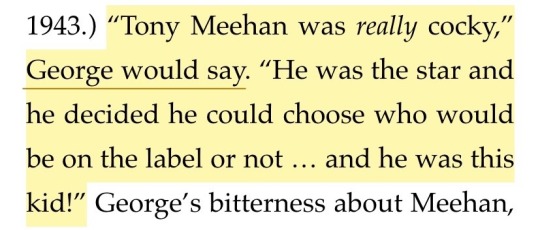
*Love the "George would say——" Uh, would he? Well, I guess after all that trouble you went to, he would now. It's really incredible how cavalier Lewisohn is about a Beatle's words.
These sorts of reconstituted, lab-engineered, made up “quotes” are shot throughout Tune In. “Quotes” made up of words from two, three, and even four sources, spoken months or often years apart.
Ala Carte Creations 🍱
It really is a buffet, and these ala carte creations come in all shapes and sizes. They might just be words that have been plucked up and glued back together to make something more useful to a particular narrative. (Ellipses or dash optional.)
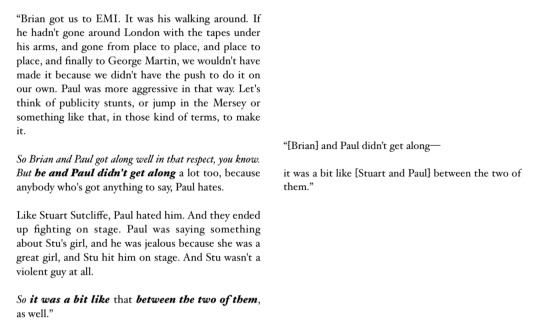
TUNE IN: “John saw a bigger picture, and it would be surprising if it wasn’t equally obvious, or made obvious, to Brian and George. He likened Paul’s enduring snag with Brian to his other long-standing difficulty: ‘[Brian] and Paul didn’t get along—it was a bit like [Stuart and Paul] between the two of them.’” (Footnote 37: Interview by Peter McCabe and Robert D. Schonfeld, September 1971)
Bonus 🍒 Phoebe's dramatic reading of John's original quote:
The Donut 🍩
Then there are a seemingly uncountable number of “quotes” with a sentence or three ripped out from the middle, but with zero representation that more words were ever there. (And in most of these particular deceptions, the simple representation of something excised (. . .) would make the quote fine. There are a lot of these, but they are also the easiest to fix.)

Chapter 10: “I was in a sort of blind rage for two years. [I was e]ither drunk or fighting. **It had been the same with other girlfriends I’d had.** There was something the matter with me.”
And then there are the true buffet bonanzas, words lifted and twisted beyond recognition until they say something brand spanking new.
However, John remembered Paul’s attitude to Brian being very different. John was always emphatic that Paul didn’t want Brian as the Beatles’ manager and presented obstacles to destabilize him, to make his job difficult … like turning up late for meetings. “Three of us chose Epstein. Paul used to sulk and God knows what … [Paul] wasn’t that keen [on Brian]—he’s more conservative, the way he approaches things. He even says that: it’s nothing he denies.”
The Lewisohn Remixes 🍸
And then there are the “paraphrases.” I couldn’t even begin to guess how many of these there are, and often they aren’t even paraphrases, but whole new Mark Lewisohn re-interpretations with quotation marks slapped around them. But if you don’t check, you probably won’t know, because like this Lewisohn rewrite of a well-known Mrs. Harrison quote, there’s a good chance you’ll recognize the bulk of it, making it less likely that you’ll catch the scalpel work excising Paul. And while I don’t want to get caught in the nooks and crannies of intent in an example like this one I have to say, just this once, that what has to be a purposeful excising of Paul to create a slightly new quote on one side, combined with a badly acted, bad faith—(or bad scholar)—“Where was Paul when John’s mom died?” on the other, is par for the course.
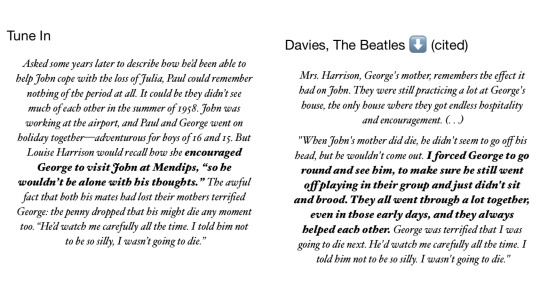
George Harrison’s mom’s made up Lewisohn rephrase which coincidentally removes Paul from the imagery.] ❦ LEWISOHN:“ Asked some years later to describe how he’d been able to help John cope with the loss of Julia, Paul could remember nothing of the period at all. It could be they didn’t see much of each other in the summer of 1958. John was working at the airport, and Paul and George went on holiday together—adventurous for boys of 16 and 15. But Louise Harrison would recall how she encouraged George to visit John at Mendips, “so he wouldn’t be alone with his thoughts.” ❦ DAVIES: “They were still practicing a lot at George’s house, the only house where they got endless hospitality and encouragement. . . . I forced George to go round and see him, to make sure he still went off playing in their group and just didn’t sit and brood. They all went through a lot together, even in those early days, and they always helped each other.”
Why do you have to slice and dice and reconstitute people’s words? No writer, and certainly no historian, should ever feel empowered to take words from a historical figure from two or three different places and topics and times, splice them together, and tell us, “Winston Churchill said this.” No he didn’t! Why are you so intent on changing the words of the people you’re writing about? What’s wrong with just using two different quotes?
You cannot take two or three quotes from two or three or even four separate statements, stick them between one set of quotation marks and say John or Paul or George or Joe Smith said this.
No they didn’t. They never said that. Why do you want me to think they did??
All these words are Abraham Lincoln’s, but this is not a Lincoln quote:
“Every man is said to have his peculiar ambition. Whether it be true or not, I can say for one that I have no other so great as that of — making a most discreditable exhibition of myself.”
(I kept it ridiculous, although I didn’t have to.)
But I want you, the reader, to be saying to yourself, “Okay, enough already. I get it!” Because in the last few days I have wandered too far into the weeds too many times and written far too many words detailing the multiplicity of ways Mr. Lewisohn does violence to each and every law of reporting historical facts, and could write many more. And I will post a more detailed list of the crimes against the quote that I am charging Mark Lewisohn with as we go forward, but I don’t think we need that now. The fact is that every fair-minded person knows what quotation marks represent, and there is no more fair-minded group of people than serious Beatles fans and scholars. And it is those fair-minded scholars who I want most to hear me. Whether you’ve written books or host a podcast or just know that you know a whole lot of stuff and take seriously your part of the trust in preserving the truth about The Beatles for us and future generations, it is you I am really talking to. My Cicero quoting-freaks. The ones who care about getting it right.
“The chief, the only, aim of style is to put facts in a clear light, with no concealment.”
- Lucian of Samosata
What footnotes can do, and what footnotes can’t.
You can list multiple sources in a single footnote. That’s not only fine, it’s correct. If I want to tell part of a story based on several sources, that often means several sources in a footnote. But not for one, single quote.
The problem isn’t the footnote, it’s the bioengineered quote on the page that you swept under a footnote hoping I wouldn’t notice.
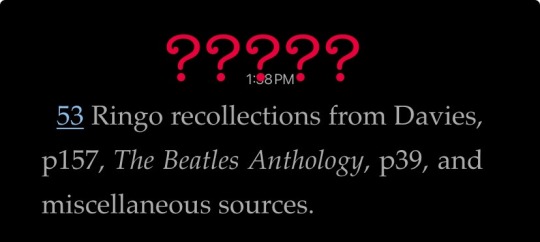
Which leads us to what a footnote is not. A footnote is not a post-hoc fixative for your textual sins. You cannot do whatever you want as long as you confess it in a footnote. A footnote is not a magic spell. A footnote is not the universally understood symbol for “I have my fingers crossed behind my back.” You cannot fix lies and misrepresentations in the footnotes. Footnotes aren’t for trying to chase down three different sources to match up which part of a manufactured “quote” someone said on which date. Footnotes are not the picture on the front of a puzzle box. I should not need to find corner pieces to figure out which of these George Harrison words were actually spoken together.
Footnotes are a truthful and independently verifiable record of primary sources. It’s that simple.
And taking Mark Lewisohn completely out of the picture for a moment, I feel sure we can all agree that neither John Lennon nor Paul McCartney nor George Harrison nor Ritchie Starkey would want anyone rearranging their words as if they were guitar chords. You wouldn’t take three-quarters of Penny Lane and one-quarter of Across the Universe, put them together and call it a Beatles‘ song. So don’t take three quarters of John to Jann Wenner and one-quarter of John to Lisa Robinson, put them together and call it a Beatle’s quote.
MY PERSONAL STANDARD IS THAT IF SOMEONE REPRESENTS, “A BEATLE SAID THIS,” IT BETTER DAMN WELL BE SOMETHING A BEATLE SAID.
None of the Beatles, dead or alive, would be cool with their words being taken out of context at all, let alone two or three different statements on god knows what being combined into one. This isn’t hard, though. Use two or three separate quotation marks, and don’t take statements out of context. Don’t mix and match their words, but don’t twist them, either. If a person said something, it is the historian’s duty to represent those words to the best of your ability, and then use them to tell a factual story focused on what you feel is important. Staying true to the original words and true to their meaning. If you can’t use those words without twisting them, then change your story to fit their words, not the other way around. If their statement helps tell the story your way, use it! For goodness sake, John Lennon said at least two opposing things about almost every topic on earth, so there should be enough to choose from without being deceptive. I actually want the truth. Don’t you?
Biography is story based around accurately represented, trustworthy and verifiable facts. And look, Beatles fans, whoever your favorite is: we are not going to get the truth about his history if we don’t learn to take these things seriously. Let’s have—if not high standards—at least the lowest generally accepted standards. In the mid-term we need a lot more Beatles scholars with a lot more points of view, and now—right now—we need experienced Beatles scholars to prioritize searching out and finding smart, interested people to mentor. And we simply must ensure that we aren’t allowing to solidify into stone “facts” that are not facts and statements no one ever made. I don’t think any honest Beatles fan—(which rounds up to all of them)—wants any question around that issue.
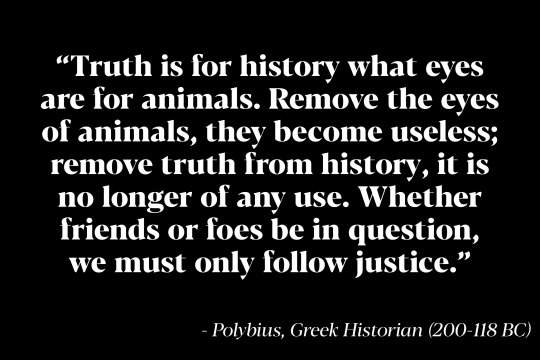
The record is the most important thing. Now, and always. This is not about John versus Paul. John versus Paul may live on always in our hearts, but for Beatles history, it’s the wrong question. I’d rather someone be up front about their loves, but in the end the focus should be on representing the primary facts in their most pristine form. Love who you love most, but place truth above all. Pristine facts. Pristine quotes. Nothing hidden. Nothing misrepresented.
Let the historical actors speak for themselves. That is their right.
And the historian’s duty.
NEXT, WE DISSECT A MONSTER.

Final note: I became frustrated and (maybe strangely) offended by Lewisohn's obscene pretenses in 2020, but my frustrations were nebulous and unfocused until this incredible AKOM series. I feel much better now. Angrier. But better. They worked their asses off. 🥂
#lewisohn#akom#the beatles#tune in#fine tuning#frankenquotes#lewisohn's monsters#historiography#paul mccartney#john lennon#george harrison#ringo starr#mark lewisohn#a beatle never said that#beatles#brian epstein#allen klein#Spotify
161 notes
·
View notes
Text
Backwards Tape During Revolver Sessions
The big claim to fame of Revolver is the unique tape techniques used in recording. The one that gets a lot of attention is the backmasking technique, where the tape is fed in backwards for the reverse tape sound. It appears on Tomorrow Never Knows and I’m Only Sleeping for guitar solos and Rain for John’s vocals.
Looking up the recording dates on BeatlesBible…
April 6: First day of Revolver sessions; they record takes of Tomorrow Never Knows, which has Paul’s guitar solo backwards
April 16: Working on Rain, where the backwards tape is used on John’s vocals
May 5: Working on I’m Only Sleeping, where it is used a third time on George’s dual guitar parts
Who has the idea to play the tape backwards first?
There’s two conflicting accounts on the backwards Rain vocals.
In his David Sheff interview (1980), John mentions it was a stoned idea he had:
I got home from the studio and I was stoned out of my mind on marijuana and, as I usually do, I listened to what I’d recorded that day. Somehow I got it on backwards and I sat there, transfixed, with the earphones on, with a big hash joint. I ran in the next day and said, ‘I know what to do with it, I know… Listen to this!’ So I made them all play it backwards. The fade is me actually singing backwards with the guitars going backwards. [Singing backwards] Sharethsmnowthsmeaness… [Laughter] That one was the gift of God, of Ja, actually, the god of marijuana, right? So Ja gave me that one.
In his interview with Lewisohn (1988), George Martin says it was his idea:
I was always playing around with tapes and I thought it might be fun to do something extra with John’s voice. So I lifted a bit of his main vocal off the four-track, put it onto another spool, turned it around and then slid it back and forth until it fitted. John was out at the time but when he came back he was amazed. Again, it was backwards forever after that.
So is the conflict a case of bad memory or bullshit?
I would assume the scales tip in George Martin’s favor just by virtue of him being sober. Not to say the stoned accident couldn’t have happened, but that John may be misremembering the sequence of events. That said, a happy accident sounds more reminiscent of other unique sounds the band used than an intentional one.
However, it’s not like the idea of putting tape in backwards for a different sound was a new discovery. It’d been known since the introduction of sound playback, the technique was used in experimental music in the 50s/60s, but it just wasn’t used intentionally in pop music. George Martin had already been recording sound effects in comedy albums and may have used it for weird sounds before.
Yet, if this wasn’t really new to George Martin, would he even remember what led to the decision? And why the oddly specific mention of John being out of the room at the time?
Also, both of these accounts are about John’s vocals for Rain. But Tomorrow Never Knows is recorded before Rain and includes Paul’s guitar solo backwards. So was Rain not the first time they use this technique?
Paul’s account in MYFN about backwards guitar solos seems to suggest a happy accident like John’s:
It played backwards, and, ‘What the hell is going on?’ Those effects! Nobody knew how those sounded then. We said, ‘My God, that is fantastic! Can we do that for real?’… So that was what we did and that was where we discovered backwards guitar. It was a beautiful solo actually. It sounds like something you couldn’t play.
But Paul stops short of naming the tape operator.
Geoff Emerick had been tape operator since 62 but was just been promoted to engineer before Revolver sessions begin (at the wise age of…20?!). In his book, he names Phil McDonald the tape operator. He was also relatively new.
But Geoff Emerick’s book backs up John’s story:

So we have John claiming his stoned accident for his vocals supported by Emerick vs George Martin’s claim he intentionally had the idea while John was out of the room vs Paul claiming an accident via an unnamed third party (that may have been newbie Phil).
Have any others weighed in to confirm or deny either account?
To be overly generous, I could see how Paul could be right about this being an accident initially. And then John and George separately have the idea to use it for vocals 10 days later.
But then I wondered about the timeline and how three accounts single out Rain vocals. Maybe Rain *was* the initial backwards tape and then they applied it to the Tomorrow Never Knows guitar solo later, such as when they did it for I’m Only Sleeping?
Turns out, overdubs with the reverse guitar solo on Tomorrow Never Knows were added April 22. So Rain was indeed their first use of backwards tape.
So the timeline actually looks like this:
April 6: First day of Revolver sessions; they record initial takes of Tomorrow Never Knows, which will later include Paul’s guitar solo backwards
April 16: Working on Rain, they use the backwards tape for the first time on John’s vocals
April 22: They use it a second time for the overdub of Paul’s guitar solo on Tomorrow Never Knows
May 5: Working on I’m Only Sleeping, they use it a third time on George’s dual guitar parts
This order makes me suspect John’s account is actually the more credible one.
Who do you believe?
#revolver#john lennon#rain#george martin#tomorrow never knows#revolver sessions#backmasking#backwards tape#1966#my text#sleuthing#historiography#john speaks#date questions#drugs and the beatles#listening to revolver 2022#geoff emerick#here there and everywhere book#gonna have to post his theory pauland george martin connived to get him as engineer on revolver to allow for more experimentation#he was tape operator since 62 so i didnt realize he was only 18 in 66?!#norman smith and the other engineers were ancient by comparison#edited to correct emericks age in 66 hes still a basically a kid tho
31 notes
·
View notes
Text
post about the parallels between John Lennon and Prince Harry when
#there is an entire ESSAY here?????#maybe a whole-ass media studies/historiography thesis#there is also one placing the british papers' smear campaign on meghan markle#in the context of a long history of punching down and ripping apart normal unpowerful inoffensive WOC for sport#nadiya hussain and jessica saldanha come to mind but. like#one is Spoiled for Choice.#i assume *that* article already has been/is being written though and i'm not remotely qualified#the comparison to john's departure from the beatles & the uk tho...#... the dramatic public climax that really resulted from *decades* of dysfunctional 'stiff upper lip'/#'don't have difficult conversations'/fucked-up social dynamics...#... and an entitled public happily glomming onto yoko in order to cope with their hurt parasocial feelings...#i might be able to at least provide some notes on *that* topic lolll
4 notes
·
View notes
Text
Understanding Lennon McCartney Rewatch Part 2.1
Cynthia and John are worse and crazier for admitting what they admitted in the bio. But Jane and Paul are not exempt.
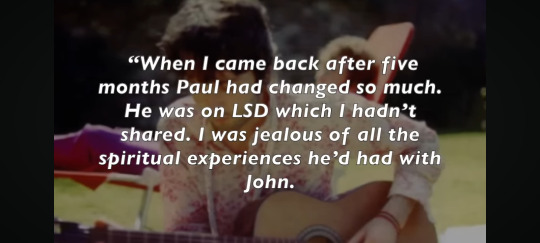
Will forever love this pic of Paul and Julian. He does not look like the fun uncle. He looks tired and dependable. Just stepped out of the womb as a father, didn't he? The sperm that fertilized his egg probably passed some fatherly advice and hair tussles to the other sperm as it passed them.
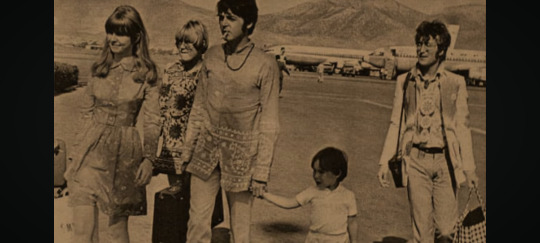
They should've bought the fucking island.
They never look more like a couple than when the women they're actually dating are right next to them.

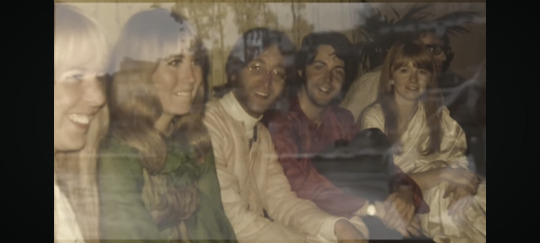
The India footage actually looks so beautiful. Obviously it's a beautiful place, but they all genuinely look so free and at peace there. It really could've been so good for them. Getting enlightened, getting soberish, growing closer as a band, taking a much-needed rest. It should've been good.
The music choices in this documentary! The drastic shift from, “all you need is love” and “the dream I had was true” and “I don't need much to set me free.” to Paul leaving to “yes I'm lonely. Wanna die.” “I'm going insane.” “Look at me. Who am I supposed to be?” 8d8 psychic damage. And the thing is it's real. John really did flip a switch, just like that.
Smashing my head into a wall. It's the same as Yoko's quote about how ‘nobody hurt John more than Paul.’ Really Pete? Worse than after his mum died? Really Yoko? More than that drunk cop? Paul, what the fuck did you do to him in India, seriously, because at this point in the doc I can't accept the theory that it was just some lack of communication, I just can't.
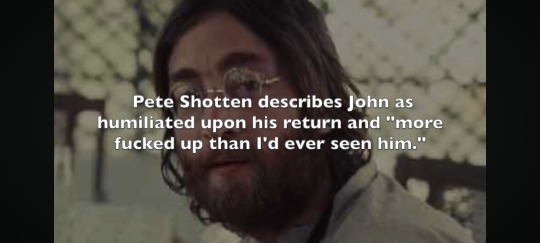
It's also telling to me that when John's losing it, everyone's solution is some time alone with Paul. Nobody panic. Paul can fix him. Little do they know Paul's the one that broke him. Or maybe they do know and that's only another reason they know Paul's the only man for the job?
Old-fashioned ad voice: You liked Protective Jesus Scandal Paul? You'll love Protective LSD Scandal John! Really. Before the question is even out, he's making fun of it. I think he cuts off the interviewer at least three times with jokes before he can get the sentence out, and by the time he is, Paul's giggling too hard to feel bad about his little PR fuck-up.
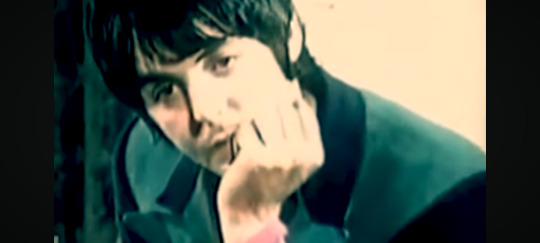
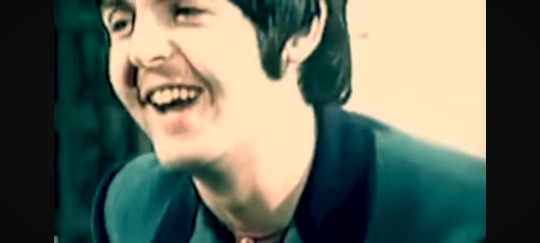
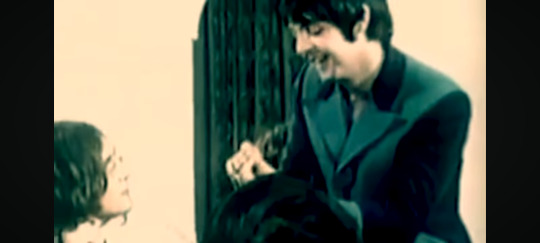
Then he lets Paul talk a bit before jumping back in, this time with his Hard Man suit on. It's just so good. A testament to their unconditional love, really. Because, clearly, Paul's just hurt John pretty bad. And yet, here John is. Using every trick he's got to defend his friend.
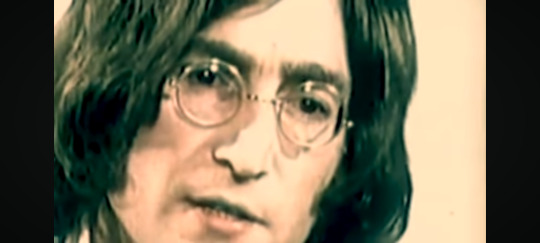
But actually, though John is supposedly the one everyone's worried about, Paul's doing a pretty shit job of being the “stable” one. This entire press tour he's either fucking blazed and laughing at everything or disassociated and not contributing.
(((except during that political discussion – again! Paul secretly has actual thoughts on actual things?!)))
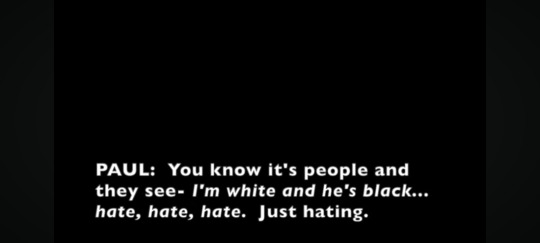
But for the most part, John's absolutely holding down the fort. I wonder if this is another case of everyone – all their friends and business associates, just like we as a fandom still do now – assuming John is the problem child, and Paul's the strong one, but actually they're both both.
Back to the political interview. They're just so in sync. Finishing each other's sentences when you're talking about the weather or your shared work is one thing. Finishing each other's sentences on complex topics like why poor whites often vote bigots in or the cause of rampant misinformation is quite another.
“Letting his dad cut his hair at sixteen, seventeen.” You all know that John hates Jim quote.

John: so there's war, and vegetables. There's relativity and absolute. Paul (absolutely smitten): that's great Johnny. Int: that's rather hard for people to interpret. John: well if they can't interpret it now, maybe they will later..... 1. John really was extremely intelligent. 2. That last statement sums up Beatles historiography.
Paul really just Won't be alone with John, will he? Well, two can play at that game, Paul, and John's going to win, let me tell you.
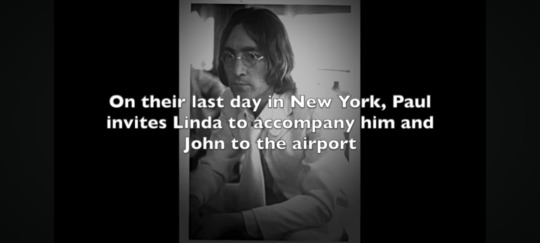
But he's going to do one last panic grab for attention first.
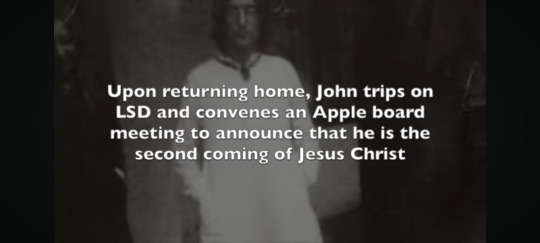
I really do think if John had done something like that *before* Paul would've given him that attention. Told him he's being insane and taken him home to splash some cold water on him or something and then given him whatever softness Paul was capable of. But not anymore.
I wonder if Paul could go back to 1966 if he just wouldn't have taken John to that Indica show where he met Yoko. If he would've just said “okay John, sure, let's just stay home and trip on the couch tonight.” I don't know.
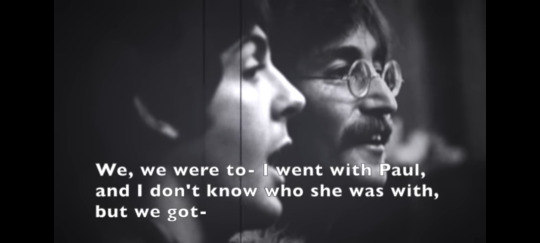
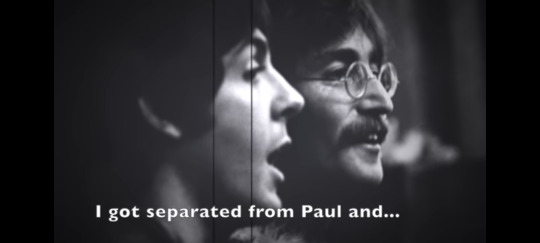
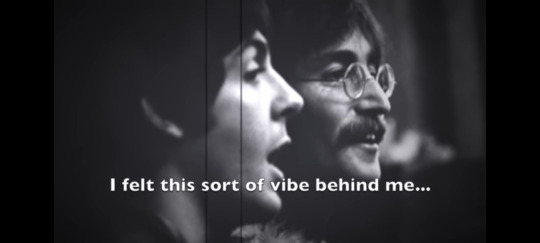
Anyway, Yoko gets an A+ for persistence. Imagine being Paul, George, or Ringo, though, and John is suddenly madly in love with this woman whose been begging you all (and then him specifically) for a platform for over a year? It would be weird to say the least.
John: don't you hate me? I'm crazy, you know. Paul: no I don't hate you. John: aren't you pissed at me now, Paul? Even a little bit? Paul: I'm very proud of you. It's the unstoppable force (“Don't ‘nore me, Mimi!”) vs the immovable object (“I learned to put a shell around me”.) Someone get them some professional help before they nuke the whole world.
“There is, however, a desire to get power in order to use it for good.” One of those quotes that just really lets you see a person, you know? Benevolent dictator Paul.
Yoko, why are you talking about how bad your boy doesn't want to fuck you right in front of all his closest friends and on record for posterity? If you have to be talking about your sex life, shouldn't you be lying about how insanely horny he is for you? Oh, right, she will think of that, just not yet.
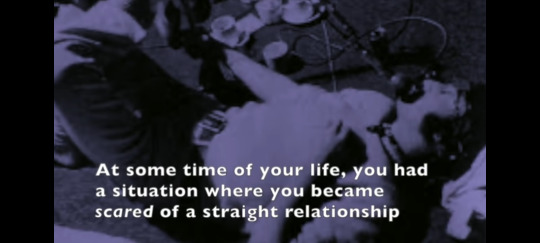
And then she waxes poetic about how turned on John is when he's working on music with Paul. Cool. Smart. Thanks for that, though, genuinely.
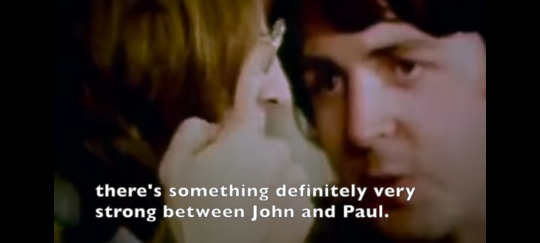
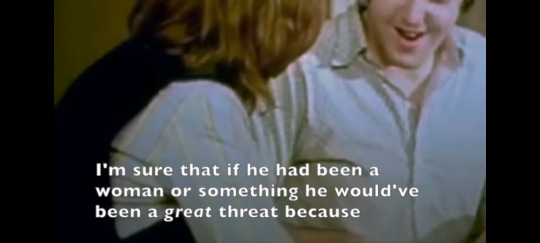
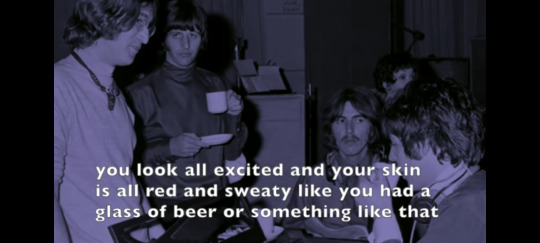
And Then (gosh, Yoko is such an asset to Beatles history when she's not actively spreading misinformation. Everyone give her a hand) she goes on about how Paul goes out of his way to make her feel respected and even valued. Compare that to John and Linda, anyone? And I want to be clear, I'm not saying this means John cares too much and Paul doesn't care at all, which might be the surface read. I just think John's reaction was to scream in everyone's face that he was in pain and Paul's was to insist ad nauseam that he was fine. You know?
#paul mccartney#the beatles#john lennon#mclennon#ringo starr#george harrison#yoko ono#linda eastman#ulm#understanding lennon mccartney
219 notes
·
View notes
Photo
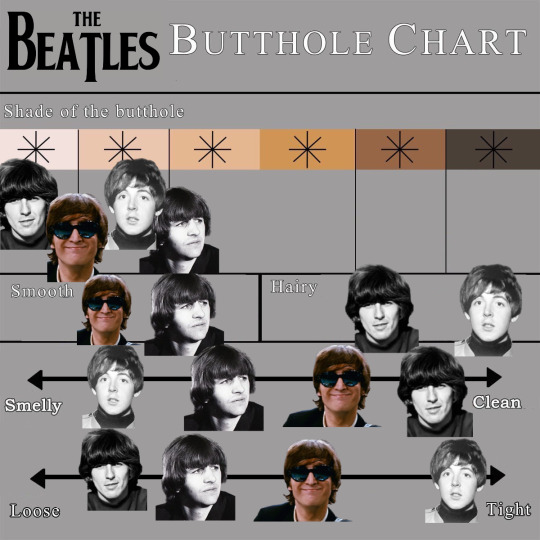
So r/beatlescirclejerk posted a butthole chart which I immediately dragged back to the Discord server for discussion. A consensus has been reached and I present to you the new and improved Beatles butthole chart. I will post some of the discussion and reasoning behind these choices as well as my personal take on John and Paul combined with the knowledge learned from my high school Anatomy class 15 years ago.
mynamesbetty — Today at 1:43 PM
how dare you make me look at this with my eyes
Leggy Maddingway — Today at 1:44 PM
This is extremely important Beatles historiography
mynamesbetty — Today at 1:54 PM
We saw John's butt on the back of Two Virgins, I don't recall it being hairy
Leggy Maddingway — Today at 1:55 PM
That's a good point as well
We have a full shot of John's butt, a side view of Paul's butt, and a suspected shot of Ringo's butt....do we have a shot of George's butt
What i find interesting is the skintone chart, i always figured Paul's butthole would be pink.
mynamesbetty — Today at 1:59 PM
butthole color is the same as lip color
VeggieRavioli — Today at 2:06 PM
I am ignoring this notification in protest
namaste — Today at 7:22 PM
What’s the saying? God has a plan? I hate how quickly I could form an opinion on this.
I think it’s mostly wrong.
John: hairless wonder, smooth as a peach, that apricot skin… Quote by Yoko (won’t fetch sorry on deadline she says yet shitposting) over how keen they were on hygiene and baths. Known to wear Witch Hazel by Quinn's throughout his life. The real flower princess.
Also, uncut. Had to be on top of that. Double-jointed, agile, loose like a cat. Happy to confirm all of the above via Self-Portrait. Do DM it anytime. I’ll find 42 mins to analyse and report.
Paul: VERY furry and soft unless he waxes (I mean he did tweeze his eyebrows at one point, who knows? Actually John does…).
Smelly if I go by a description of dog faeces and poor housekeeping by him at Cavendish. Oh, and crabs. I’ll never forget in GB George looking 🤢 while cleaning his guitar strings with an alcohol wipe.
Tight. Everything about him is tight. Very tight in fact. Tightwad, uptight and a song by John, the great Tight A$ which is most definitely not a Yoko song.
George: meticulous, good work ethic, a gentleman according to all, professional, always well presented, and the rare individual in GB who looks clean at all times. Hairy dude, but less than Paul.
One way or another, he probably had the best upkeep of all. Chakra oil all over I imagine. Known to smell good. He likely could be anything he wanted to be between loose and tight. Flexible mind in a nimble body.
Ringo: smoothest skin of all. I’m assuming the entire toolbox is fabulous. He may well have the nicest pinkest best defined hole of them all. Like George, a precise and meticulous fella. Known to smell good.
Also, likes jewellery. The key question here is does he have a third tattoo, a ring or both?
Leggy Maddingway — Today at 8:02 PM
This is the best response i could receive
Leggy Maddingway — Today at 8:09 PM
I will repost my anal-ysis from [redacted]
Leggy Maddingway — Today at 9:19 PM
Its mostly about color as we got on to talking about skintones
namaste — Today at 9:22 PM
I’ll let you guys try to find Paul’s skin tone there underneath all that soft fur of his.
Leggy Maddingway — Today at 9:23 PM
just one more reason why we need a fucking paul mccart only fans. vintage nudes
namaste — Today at 9:24 PM
Exactly. I wish EMI had put their foot down a lot harder about the Two Virgins cover. Now we would know.
“Sean, open them vaults…”
Leggy Maddingway — Today at 9:26 PM
okay okay okay so. this was in response to another person who was pondering the connection between lips and assholes, as per betty's note about lips and butt holes sharing a color. I have combined this knowledge with what I know about sex having so here we go. everything from here is me quoting myself:
Honestly to get a detailed hypothesis regarding their butthole colors we'll need to study color photos of the boys and examine their lips, compare them across decades etc
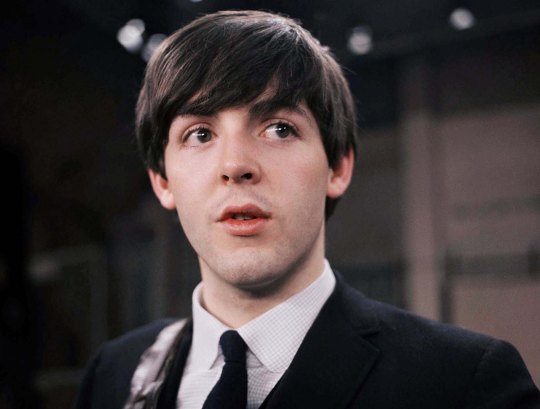
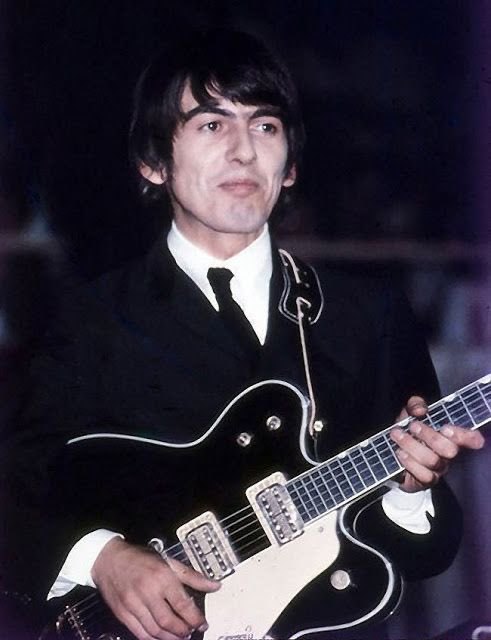
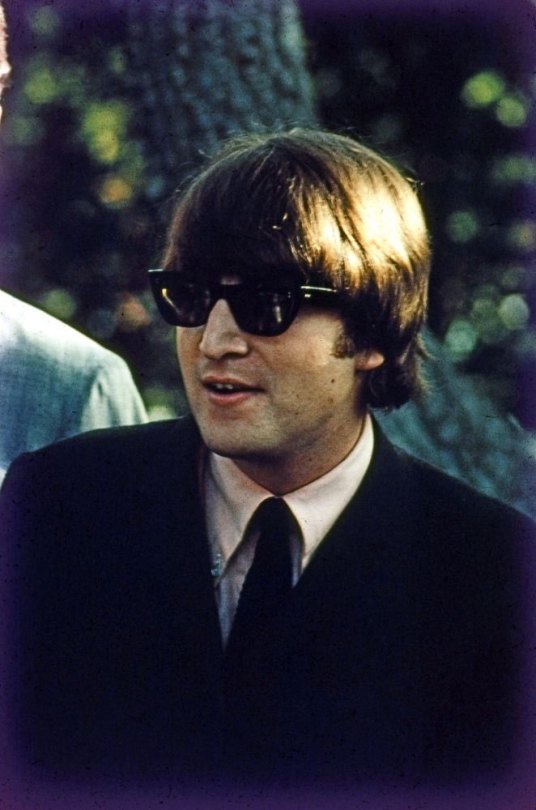
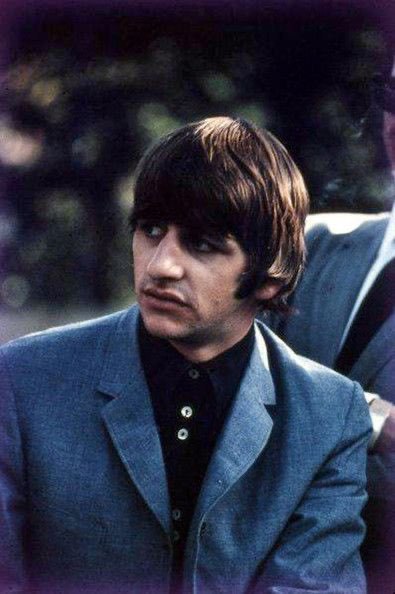
Obvs this will get easier as we get into later decades. Lighting must be accounted for and so on
Initial survey here suggests a pale pink for all of them....George and Ringo probably paler and more skin toned. John did have a phenomenon where his lips would get very raw and red when he worked up a sweat which makes sense, he's flushing because he's physically active. This is also a side effect of him being a redhead, they blush easily. From this we can also assume John's hole and genitalia would become heavily colored during sexual activity as well.
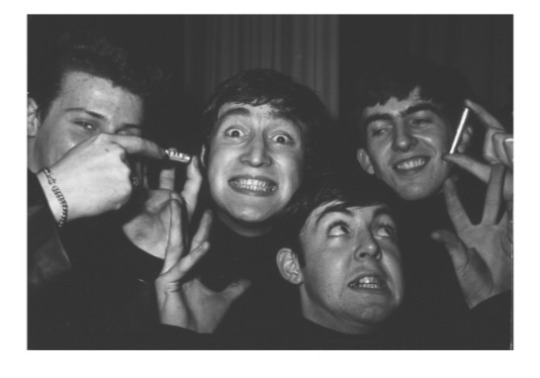

(The photos I was thinking of. Note how even in the original b&w John’s lips are noticeably more colored than normal. Compare this to other color photos where he’s sedate where his lips are paler. This is consistent with how he gets flushed when physically worked up. - Ed.)
Paul its not as obvious (so him) but just from this photo I can assume baseline that he's naturally a soft pink yknow.... Maybe doesn't flush as dark as John.
1970s we're getting more color but less hi-def photos. Keeping it to John and Paul now. Still looking like a pale pink but Paul's lips/genitalia color is more vibrant now than John's.


1980s, Paul much the same, John is notably a bit more vibrant. I bet his dick still turns purple if you don't let him cum for an hour.
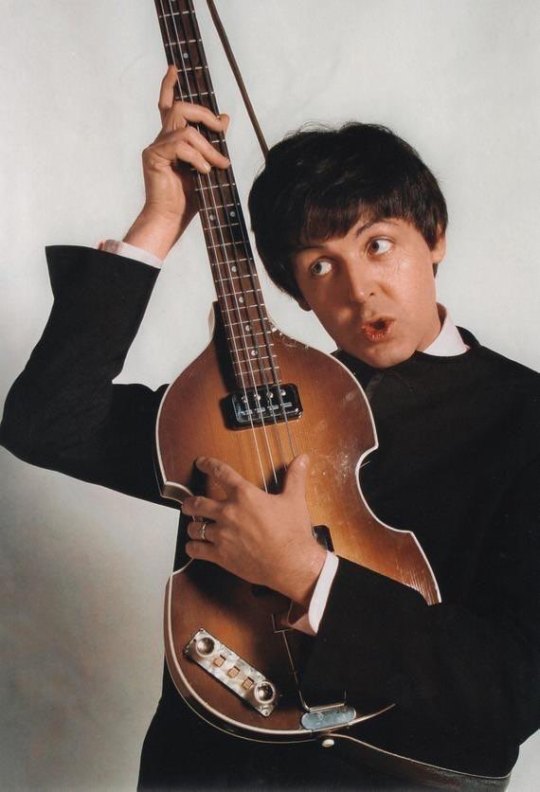

I'm doing all this from my phone so finding images is a little difficult, I'll call these findings preliminary. But from these I'm guess that Paul's hole and genitals trend towards a pale pink and flush a deeper pink during sexual activity. John's would be pale, probably only a shade or two darker than his original skintone and then he flushes a very deep and dark red during intercourse.
[someone in a second Discord server asked me if I was going to survey the Beatles' relatives and try to build visual profiles based off their appearances in order to build a bigger skintone chart that can tell us more about the Beatles’ blush patterns.]
What it would actually require is examining photos of male genitalia from the same ethno groups that the Beatles belong to, keeping in mind that even for their time their families were heavily mixed thru intermarriage between Irish and Anglos. I don't mind doing it but it would take a while so examining their lip colors is suitable for now.
We live in a world where there's no Paul McCartney Only Fans and I can't pay money to see his asshole get railed with a knotted Bad Dragon dildo. truly we live in the darkest timeline.
namaste — Today at 9:32 PM
John slept with Bowie who you know... I’d think your description explains why that was not repeated. He probably couldn’t sit down for a week. Sang fairly high in Fame.
Leggy Maddingway — Today at 9:32 PM
bingo
namaste — Today at 9:32 PM
We’re breaking ground here as always.
Leggy Maddingway — Today at 9:33 PM
I'm sure john and paul are both very tight tbh though paul probably remained so and struggled to relax -- made it good for john though, I don't think he's the type who would complain about it.
Leggy Maddingway — Today at 9:37 PM
otherwise I believe your guesses about their hygiene and the scents they used are spot on. wouldn't surprise me at all if Paul was hairy down there, someone on reddit reminded me that it's about what's between the cheeks not necessarily on... its not unusual to have hair there either. It's one of those things that gives Paul a masculine edge to salt his femininity, I doubt John had any complaints considering the caliber of men he was used to hooking up with.
</end quote
From these discussions and my own thoughts, I built the new and improved Beatles butthole chart. Please let me know what you guys think. I will be updating this post if any new information comes to light or if I find my notes from my Anatomy class. Cheers!
#the beatles#paul mccartney#john lennon#george harrison#ringo starr#mclennon#my meta#beatles meta#talktalktalk#shitpost
39 notes
·
View notes
Text
this is the historiography beatles fans want, just short scenes that read like an acid trip

65 notes
·
View notes
Note
So wild to see a mention of Kenneth Womack. I always forget that he’s a known Beatles expert and not just my old English professor lol
Beatles Historiography Claim To Fame!
2 notes
·
View notes
Note
Have you ever read "Fifty Years Adrift" by Derek Taylor (edited/annotated by George)? It looks really interesting. I wish there was a way to read it without spending a fortune.
Hi, anon,
No, I haven't read it either (as you mentioned, it's far too pricey). I've only read the introduction by George -- pictured in auction preview listings at times -- and someone's blog entry about the book, which includes some excerpts. Here's the link to that.
It would be fantastic if there's ever a regular paperback edition of it, because I suspect that it would add a great deal to the historiography of The Beatles, collectively and individually.
Thanks for asking!
#asks#anonymous asks#Derek Taylor#Fifty Years Adrift#The Beatles#George Harrison#Paul McCartney#John Lennon#Ringo Starr#et al#fits queue like a glove
3 notes
·
View notes
Text

This is Spinal tap was made in 1982. the fictional band draws from many influences to pastiche but the main duo nigel and David are very clearly based on John lennon and Paul mccartney. This may be inferred from some life parallels, particularly their early work and origin story, but mostly due to the intensely close relationship on display between them which becomes the most sincere beat of the film, seeing them make up and reform in the final concert. in spinal tap not only is their close friendship emphasised, the framing of the yoko ono parallel character jeanine is very heavily implying romantic feelings on nigels end. In the deleted scenes there's a reprise of a sweet earlier moment where they remember the first song they wrote together ("all the way home" also clearly inspired by songs in the "one after 909" vein), where David starts playing it on the guitar after noticing nigel sitting glumly, and the two fall into a cheerful nostalgic duet. All the way home. On their way back home. This being a film from the early 1980s right after John lennons death rocked the world and transformed beatles historiography along with Philip Norman's Shout which would famously disparage Paul and the others in favour of venerating John. Public opinion was very much in the "they weren't even close friends just creative rivals" camp. But the spinal tap creators got it they got the dynamic so poignantly and rebirthed it in these characters who are literally parodies yet are so well lived in and realistically portrayed mostly through improv that they just feel real. And yet also a love letter to 2 different real people one of whom was recently dead the other reeling from the grief. And they made them make up get back together and pull the band from the brink of death like the ultimate wish fulfilmemt and this is a funny mockumentary about rockstars but I'm crying about spinal tap
6 notes
·
View notes
Text
Hunter Davies Bio - Introduction - On the Beatles as holders of their own history:
"It was always difficult to get any of the Beatles to concentrate on anything for more than a few moments."
Fun collective ADHD you’ve got going on there, boys.
"They were useless, when it came to dates, and even the years."
"Fans would make very good detectives."
This just amused me a lot. Hunter, you got it.
6 notes
·
View notes
Note
can you explain that post about jann wenner? i know he was the founder of rolling stone (?) magazine but idk much else
(Post anon is referring to!)
Okay so before I jump into this, I just want to make two disclaimers:
Firstly, that Im not an expert on Jann Wenner or Rolling Stone Magazine. I read the first 50-or-so pages of Sticky Fingers by Joe Hagan (and I enjoyed it btw, I just haven’t finished it yet because it wasn’t really clicking for me at the time!), but beyond that, this isn’t really my area of expertise. So I might be missing a few things here and there, which any of you are welcome to add if I have missed them and you feel they’re important!
Secondly, Im also not trying to take sides here. Im just trying to put the reasons why Paul has historically disliked Wenner into a post—and you can call him petty for them or you can say ‘fair enough’. That’s up to you.
So why has Paul disliked Wenner in the past, and why are people surprised about him referring to Jann as a “friend”?
Essentially, from what I know of The Situation here, Paul has historically disliked Rolling Stone Magazine and Jann Wenner because of a few things.
Firstly, a lot of the magazines critics gave his solo/Wings works poor reviews. I won’t get too much into music-criticism side of things, because you can find reviews of his albums archived on the rolling stone website easily enough, and I don’t think it requires much explanation to see why Paul would resent the magazine and certain critics for that. I will however just throw in this tid-bit from Jon Landaus review of RAM in 1971 as an example:
The album’s genre music—blues and old rock—is unbearably inept. On “Three Legs” they do strange and pointless things to the sound of the voice to liven it up; it doesn’t work. “Smile Away” is sung with that exaggerated voice he used for the rock & roll medley in Let It Be: it is unpleasant. The “When I’m Sixty-Four” school of light English baubles is represented by “Uncle Albert/Admiral Halsey,” a piece with so many changes it never seems to come down anywhere, and in the places that it does, sounds like the worst piece of light music Paul has ever done. And “Monkberry Moon Delight” is the bore to end all bores: Paul repeats a riff for five and a half minutes to no apparent purpose.
(I know I said I would try not to take sides here, but come on, Monkberry Moon Delight is a banger through and through!)
But then there’s Lennon, Remembers and the role Jann Wenner had in the aftermath of the Beatles breakup, and as well the construction of a certain historiographical narrative which Erin Torkelson-Webber cites as ‘The Gospel According To John’.
Lennon Remembers was an interview conducted in December 1970 between Jann Wenner, John Lennon and Yoko Ono, where John remarked a lot of not-so-nice things about people he’d known, including Paul McCartney.
The interview was published in the magazine in 1971, and John was allowed to edit it. But then Wenner wanted to publish it in full in book-form, which John objected to. Regardless though, Wenner made a $40,000 book deal and published it anyway.
John never spoke to him again after that.
Joe Hagan mentioned his interview with Paul on this podcast interview (which id highly recommend recommend listening to in full, it’s interesting!), and said:
I was asking [Paul] questions that nobody had ever bothered to ask him: What’s your opinion on Rolling Stone and the coverage you and your relationship to its publisher?
[…] [Rolling Stone] were partisans for John Lennon, and that John and Yoko used Rolling Stone to telegraph their independence from the Beatles. Well it turns out that Paul had an opinion about that. And he felt strongly about Rolling Stone as a result, or he had kind of ambivalent feelings—and sometimes not ambivalent—about Jann Wenner.
[…] And then over the long term, of five decades of Rolling Stone, the invention of the Rock N’ Roll Hall Of Fame […] He’s observing, Paul McCartney is, that his legacy as a member of the Beatles is being downplayed to John Lennon, making McCartney the second banana. In which he’s like ‘no, the songs are Lennon/McCartney. We co-wrote these songs.’. So he resents that and now he’s at the stage in his life where he’s really wanting to make clear what he believes his legacy is and should be and what he thinks of Jann Wenner and Rolling Stone; where they play into that. Negatively, in his mind.
[…] I mean you’re talking about a view of the Beatles history and legacy through a different lens. You know, the lens of a magazine that mediated a lot of their mythology, Rolling Stone. Jann Wenner had a lot of power and at the outset was a John Lennon devotee. And he took John Lennon’s side, really.
He also goes on to talk about the Rock N’ Roll Hall of Fame incident, where he says:
When he was telling the story of how Jann had, in his mind, screwed him over on the Rock N’ Roll Hall of Fame induction, he was unvarnished. He was like ‘Jann promised me id be inducted, after I did him a solid, did him a favour—and I pick up the paper the next year and Im not inducted. And he says a bunch of choice words, you know? And I thought, well he wouldn’t just be saying that if he didn’t mean it.’
And in Hagans book, he also writes in more depth about the Rock N’ Roll Hall of fame fiasco:
It wasn’t just the underrated groups who disliked the opaque internal dynamics of the Hall of Fame. Even Paul McCartney felt Jann Wenner was back to his old tricks. McCartney didn't attend the Beatles' induction in 1988. But in the early 1990s, Wenner tried befriending him in the Hamptons, inviting Paul and Linda over to look at his new Picasso. Shortly after, McCartney got a call from Wenner. “He asked me, would I induct John into the Rock and Roll Hall of Fame,” McCartney recounted. "I said, Yeah, sure.' I put the phone down, and thought, ‘What about me?’. The thing about John Lennon-McCartney is we were all equal.”
When McCartney asked if he could be inducted too, Wenner said it wasn't up to him; there was a nominating committee, which now included onetime Elektra A&R man Danny Fields. “And it was like, ‘Oh, no, we can't do that, we can't do that,” said McCartney. “In all my dealings with him, it's never up to Jann. It's up to these ‘other people’ who are down the corridor somewhere. His thing just happens to have ‘Owner, Editor’ on the door, but they're responsible for things.”
Indeed, the offices of the Rock and Roll Hall of Fame resided inside Wenner Media, which charged the foundation $80,000 a year for rent. According to Paul McCartney, Wenner told him that if he agreed to induct Lennon, the Hall of Fame would induct McCartney the following year. And so McCartney inducted John Lennon in 1994, reading an open letter to him that recounted the highlights of their lives together. […] The next year, McCartney discovered that he was not in fact being inducted into the Rock and Roll Hall of Fame. “I rang Jann and said, I’m getting all the papers; I don't appear to be in it. You fucking bastard,” said McCartney, “We had a deal. A verbal contract that was not worth the paper it was written on. So that didn't endear me to him.” (Wenner said he didn't remember making such a deal.)
Far from receding into the past, the history of rock and roll was a living drama, beholden to the same old Rolling Stone agenda, which was Jann Wenner’s agenda. “It all added to this historical thing, that John was really it in the Beatles, and the other three weren't it, by implication: said McCartney. “To me, me and John writing, it was so equal. And sometimes it was not equal. Sometimes I was absolutely the one that got his ass out of bed. Which I don't go round saying. You won’t find me saying, ‘Oh, it was me!’ You'll find other people saying, ‘It was him! It was me!’ I don't want to do that. I'm happy with half credit.” (pg. 447-48)
As I mentioned before, Im still yet to read Hagan’s biography in-full—I do however own a copy of it, and on the blurb there’s a quote from Paul where he says:
Jann is very good friends with Bono. But you can see it. I think it's a little bit obvious. When I saw that, I thought, “They're gonna get a great review. Whether it's great or not.”
Im not sure when or where this quote came from, but Im fairly certain it came from an interview conducted between Hagan and McCartney—so from that I have to assume its a fairly recent thing Paul has said, given that the book was only published in 2017. And you can tell from these interviews with Hagan that, at least a few years ago, Paul still seemed to hold some type of resentment towards Wenner and his magazine. Hence why people are surprised about him describing Wenner as a “friend” in his recent instagram post.
In that same interview with Hagan I transcribed earlier, he also mentions Pauls agenda in saying these things:
When you’re interviewing people about this subject in particular, its not like you come to them and they’re just innocently waiting for the question. He has an agenda, Paul McCartney. He’s thinking, ‘you know? Im finally gonna lay this one down. You know, Im gonna tell him what I think.’ And I knew this was the case because towards the interview he looks at me and he’s like: “this isn’t gonna be a whitewash, is it?” And I said “No.”. And he said, “Good.”
And I do feel it’s important to recognise that the things Paul said about Wenner to Hagan (just a few years ago) weren’t done so in a vacuum. It’s no secret that Paul is a good PR man, and generally speaking, he doesn’t give off the impression that he’s someone speaks before thinking. So for him to speak negatively about Wenner kind of tells us that, as Hagan points out, there is an agenda against him.
#sorry for taking like 2 days to answer this lol#was feeling too nauseous to write yesterday#and then had to pack all day today because im moving to Liverpool on Friday (yay!)#so yeah. late reply but hope it was informative! <3#there's also a few other things ive come across in hagans book which im happy to post if anyones interested#but yeah hope this helped my luv#jann wenner#paul mccartney#beatles historiography#erin torkelson webber#lennon remembers#beatles#joe hagan
31 notes
·
View notes
Text
"The Paul of Tune In isn't real, and so he isn't relatable."
Today's AKOM was outstanding. I have so much to write and probably no time to write it until Thursday, but I had to make the time to say that it blew me away. The aspect I expected to influence me least, influenced me most: the death of Paul's mom. The writing about it. All of it. It humanized him and that loss in a way that hit me hard, and made me realize how much I'd been influenced by Tune In, even though I'd done my own critiquing of that section before.
(I want to write about the money part so badly, because I think that was very real for Paul, and I believe all the evidence shows that Jim was — or at least would have felt — much less stable than we really think about. He bet on the horses. He was the fun parent. But no, that's what I don't have time for.)
This was an excellent, excellent episode. The most powerful overall, by far. The most holistic in its picture, the most undeniable, and the one that brings me back to where I started, and with a bullet: "What story is Mark Lewisohn trying to tell? And why?" And why aren't we talking about the fact that he seems to hate Paul McCartney and Apple definitely doesn't like him?"
There are longstanding grievances, and the fact that he makes Paul McCartney into a manipulative ice cube on the page is likely not an accident.
I mean, right??
Lewisohn seems downright deceptive—may I even say manipulative?—after listening to today's episode. And although I have big problems with Lewisohn because studying the text you just have to, I have played Devil's advocate in my head through every episode, but at some point today I lost my ability to find any excuses. It is just impossible to construct any defense of this.
Fucking incredible episode. Brava, ladies.
Reminder clip: Mark Lewisohn on Fans on the Run pod — "the bastards took my name off it"
#akom#fine tuning#lewisohn#the beatles#beatles#tune in#historiography#paul mccartney#john lennon#Spotify
137 notes
·
View notes
Text
Jann Wenner et al understood John Lennon as much as they understood Paul McCartney but they thought they had it all figured out hence why so much of the Beatles story is based on a foundation of sand that we’re still wading through 50 years later.
#the beatles#john lennon#paul mccartney#jann wenner#beatles historiography#get your sticky fingers off the beatles’ legacy#listening to lennon remembers was a revelation#wenner was such a stirring shit#hence why john eventually cut him off
11 notes
·
View notes
Text
I feel like the thing we're always skirting around and trying to pin down in discussions about The Beatles breakup is that the primary thing that wedged the destructive crack in the Lennon-McCartney partnership, is this: Paul flourished under the pressure of fame, while John was completely destroyed by it.
I think every aspect of their conflict becomes crystal clear with this in mind: both John's black-and-white-style provocations and specific resentments (phonies and fakes and Business Shit), and Paul's inability to emotionally understand why his priorities exhausted the other three members of the band by the end. Things were fine when they were primarily "performing" for each other, but once Paul started to derive so much energy from performing for other people, the whole thing was gonna inevitably catch fire b/c John simply wasn't capable of doing that, and also doing so made him feel fucking insane. What John saw as abandonment, Paul saw as The Beatles reaching new artistic heights. Eventually - as their personal bond deteriorated - what Paul saw as himself as stoically shouldering John's nonfunctional deadweight, John saw as Paul taking his chance to do whatever the fuck he wanted with the band. A lot of professional and fandom ink is spilt trying to 100% justify one of these POVs, but I think it's a much more even handed tragedy than what's represented at either of these poles: which is that John was burnt-out, and Paul wasn't, but the immature possessiveness and insecurity in their relationship made the idea of taking a bit of a "break" not just intolerable, but completely unthinkable. It was the gulf opened by these opposite reactions to fame that made the emotional results of this an unbridgeable communication gap, because they just could not understand (and thus ended up deeply resenting) the way the other was acting.
Once the switch flipped in their relationship there really was no coming back because Paul reacts to pain by running from and rationalizing it, and John reacted to pain by deciding that if he felt something bad, then everything must have always been bad and thinking it was ever good was a lie. The effects of this reverberate through time as well; to this day Paul is trying to enshrine, protect and clean up The Beatles legacy, whereas John - despite dipping frequently into bouts of genuine affection and nostalgia for the band - seemed often to be gripped with an almost hysterical sense that he and Paul had built something fake and socially harmful (a terrible irony, b/c he let Yoko use him to build something that actually IS fake and, imo, deeply socially harmful).
Anyway, *puts on my (tin) wizard hat*, this is what I think 'Dig A Pony' is about, the end.
#mclennon#note: this is NOT about who behaved worst or is most at fault for the band ending#there are no opinions in here about the scale or 'validity' of their respective POVs or actions#i know john's psychological problems had a lot to do with his extreme reactions#i don't think this split was uncomplicated either b/c john had this craving for fame and exposure despite what it did to him#and Paul's ''flourishing'' didn't always make him happy and i think at some points in his career he only APPEARS to be high functioning#the beatles#j&p#anyway please discuss#i'm sure someone else has made this specific point besides me but i have an incurably pretentious posting style sorry#i'm not a tinhat i'm an academic#these two weirdos had such powerful personalities they have swayed the historiography on the topic for like 60 years now
279 notes
·
View notes